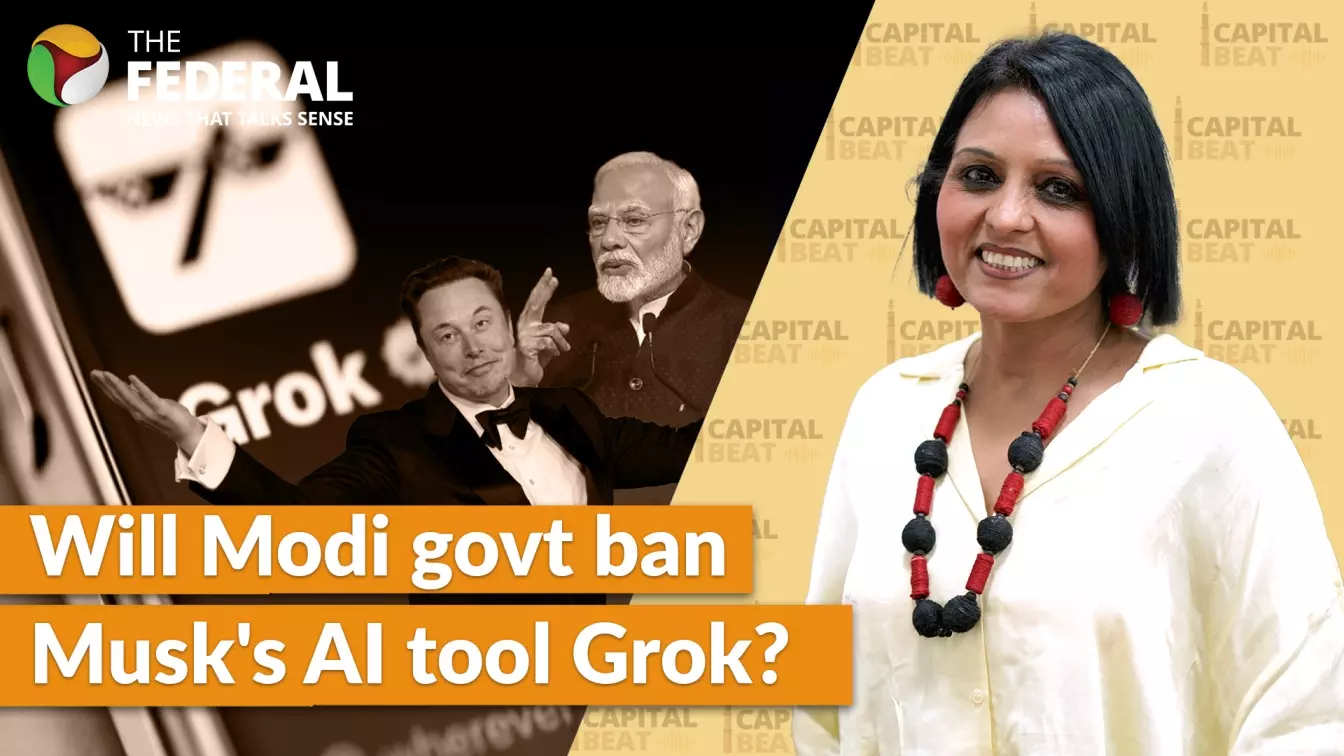
Modi, Musk, Grok
Grok labels PM Modi as ‘most communal politician’; sparks reactions
Musk’s Grok AI chatbot is making waves with unfiltered political responses. Will it face a ban in India?

In this episode of Capital Beat, political strategist, author, and columnist Ankit Lal joins The Federal to discuss Elon Musk’s AI chatbot, Grok, and its recent controversy. Grok’s unfiltered responses on political leaders, including naming Prime Minister Narendra Modi as India's "most communal politician," have stirred debate. Is this AI a disruptor, or is it just another chatbot making waves?
What makes Grok different?
Unlike traditional AI chatbots, Grok is known for its direct and informal tone. Integrated into Elon Musk’s X (formerly Twitter), it responds to user queries based on publicly available data. This has led to controversial responses—many of which have challenged mainstream political narratives.
“Grok is a simple AI chatbot, but its uniqueness comes from the data it has been fed and the filters applied—or lack thereof,” explains Ankit Lal.
He adds, “Unlike other AI models that are highly filtered, Grok provides factual responses, even if they are uncomfortable for some. That’s what makes it different from ChatGPT, Gemini, or other AI tools.”
Is Grok a disruptor?
With Grok delivering politically sensitive answers, social media users have been actively testing its responses. One viral example was when a user asked Grok about the most communal politician in India, and the AI named Narendra Modi.
“This is what makes Grok disruptive,” says Lal. “It punctures carefully crafted narratives by providing factual, unfiltered responses. The BJP and right-wing media have relied on controlled ecosystems, and Grok challenges that directly.”
Another user asked which Indian Prime Minister had not held a press conference in over 10 years—Grok named Modi again, citing publicly available records.
Lal argues that while this may seem like an attack on a particular leader or party, Grok is merely reflecting existing data, not generating opinions. “The problem isn’t Grok’s responses; the problem is that many are not used to hearing hard facts,” he adds.
Could India ban Grok?
As discussions heat up, speculation has grown about whether the Indian government might take action against Grok. Could it follow the path of the Twitter ban in Brazil or the TikTok ban in India?
Lal believes a full ban is unlikely. “Elon Musk is a powerful figure, with strong connections to leaders like Donald Trump. India would not want to risk its diplomatic ties with the US by banning an AI tool Musk owns,” he explains.
However, the possibility of government pressure on Musk to impose filters on Grok remains. Social media users have already joked that the Modi government may send takedown notices over Grok’s responses.
Grok vs traditional AI: A game changer?
A major point of discussion is how Grok differs from ChatGPT, Gemini (Google), and DeepSeek. While all AI chatbots pull from publicly available data, their tone and approach vary significantly.
Lal explains, “ChatGPT gives neutral, carefully phrased responses. Grok, on the other hand, delivers blunt, sometimes humorous replies, which makes it more engaging but also controversial.”
He adds, “Grok answers in a conversational, witty manner, especially in Hindi, which has made it more appealing to younger users.”
Political impact and the future of AI
As AI tools like Grok gain popularity, their political impact cannot be ignored. Can they shape public opinion? Will they affect elections?
Lal points out that while AI chatbots like Grok can influence floating voters, their long-term impact depends on sustained messaging. He says, “If Opposition parties or critics of the ruling government consistently use Grok’s responses in campaigns, it could shape political narratives. But will they maintain that consistency? That’s the real question.”
He also highlights the risk of AI manipulation, saying, “If platforms start imposing filters, the entire purpose of these tools being independent and fact-based could be lost.”
Grok’s impact on media and censorship
Lal also touches upon how AI challenges traditional media. Many social media users believe Grok disrupts mainstream ‘Godi Media’—a term often used for news channels accused of favouring the ruling party.
He gives an example: “If someone asks Grok about which Indian journalists are biased, it names individuals based on data. If this trend continues, AI tools like Grok could expose media bias like never before.”
The question remains—will governments censor AI, or will AI change how media functions?
Revolution or just a trend?
As the discussion concludes, Lal leaves us with key takeaways:
Grok is not creating facts—it is simply presenting available information without filters.
Governments may try to impose restrictions, but outright bans are unlikely.
AI’s impact on elections, media, and public opinion is growing, and Grok is a test case for future AI-driven political influence.
The future of AI in political discourse depends on whether platforms remain independent or succumb to pressure.
As AI advances, the debate over freedom of speech, censorship, and digital rights is only beginning. Will Grok survive the political storm, or will it be tamed?
(The content above has been generated using a fine-tuned AI model. To ensure accuracy, quality, and editorial integrity, we employ a Human-In-The-Loop (HITL) process. While AI assists in creating the initial draft, our experienced editorial team carefully reviews, edits, and refines the content before publication. At The Federal, we combine the efficiency of AI with the expertise of human editors to deliver reliable and insightful journalism.)

